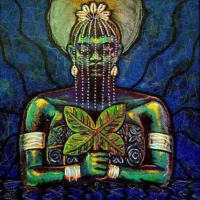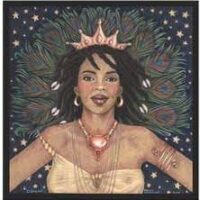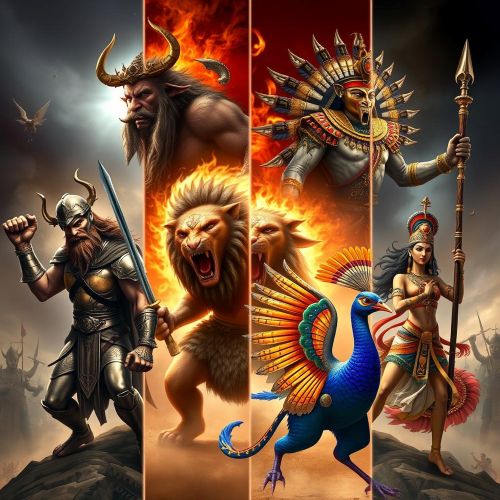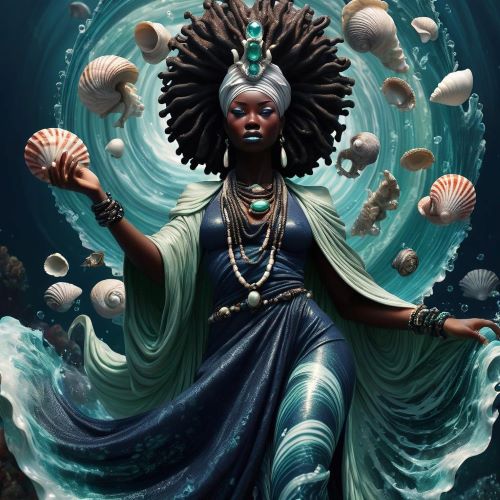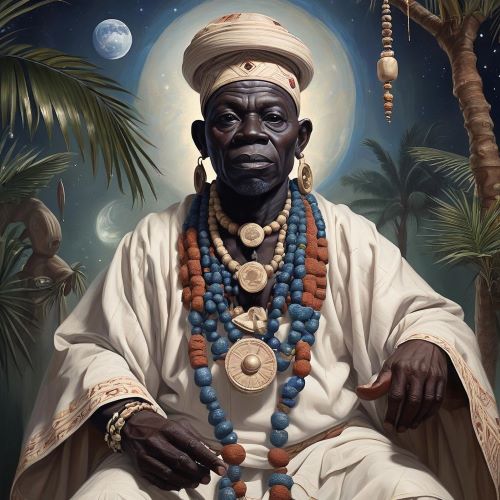Aje : Goddess of Wealth
Listen
At a glance
| Description | |
|---|---|
| Origin | Yoruba Mythology |
| Classification | Gods |
| Family Members | Yemoja (Sister) |
| Region | Nigeria |
| Associated With | Wealth |
Aje
Introduction
In Yoruba mythology, Aje is the revered goddess of wealth and abundance, holding a significant place as she embodies not only financial prosperity but also material affluence, spiritual well-being, and emotional fulfillment. Emerging from the primordial waters alongside her twin sister, Yemoja, the Orisa of the ocean, Aje governs economic prosperity and financial success. Among the Yoruba people, predominantly found in Nigeria, she is highly esteemed for her perceived power to influence wealth and success.
Aje’s significance extends beyond material wealth, symbolizing self-reliance, entrepreneurial spirit, and the collective well-being of a community. She represents a principle governing the flow of resources and is a force felt in marketplaces, fields, and the hearts of those seeking financial independence. While often depicted as a solitary figure, Aje is intricately connected to the pantheon of Yoruba deities, especially those associated with fertility and creativity, making her an integral part of the Yoruba religious and cultural landscape.
Physical Traits
Unlike many deities in various mythologies, Aje lacks a fixed physical representation and is often symbolized through cowrie shells, which are traditional symbols of wealth and currency in many African cultures. These shells are not just ornamental but are used in divination and rituals to invoke Aje’s blessings. In artistic depictions, Aje may appear as a regal, beautiful woman adorned with jewels and cowrie shells, highlighting her connection to wealth and prosperity. Her image embodies abundance, with flowing garments and rich colors signifying her benevolent nature. Descriptions of Aje’s appearance vary across different Yoruba traditions; some portray her as a mature woman adorned with gold and precious stones, while others envision her as a powerful spirit with a fluid and ever-changing form.
Common attributes associated with Aje include opulence, wisdom, and mystery. Her appearance often reflects an air of luxury and abundance, symbolizing her role as a goddess of wealth. As a deity of commerce, Aje is considered exceptionally intelligent and knowledgeable about market trends. Her true form often remains veiled, adding to her mystique and power. While Yoruba mythology does not provide specific physical descriptions of Aje, her essence lies in her divine power rather than her appearance. She is often depicted as a benevolent provider, capable of fulfilling all human needs, reflecting her integral role in the Yoruba religious and cultural landscape.
Family
Aje’s connections within the Yoruba pantheon are intricate and significant, though she is not typically linked to a specific divine family. Her relationships with other deities highlight her role in wealth and prosperity. Oshun, the goddess of rivers, love, and beauty, aligns with Aje through her domain of water, which symbolizes life and abundance. Orunmila, the oracle deity known for guiding matters of wealth and business, is frequently invoked alongside Aje in rituals aimed at achieving financial success. Shango, the god of thunder and lightning, is also associated with Aje, as his energy is sometimes called upon to protect wealth and support business ventures.
Aje’s connection to her twin sister, Yemoja, who shares her origin from the primordial waters, underscores her role in creation and abundance. Although Aje does not have a direct family lineage within the Yoruba pantheon, she is deeply intertwined with the Orishas, a group of deities and spirits who mediate between humans and the supreme being, Olodumare. Her presence complements other deities such as Ogun, the god of iron and war, and Osun, the goddess of love and fertility, contributing to a balanced interplay of forces essential for a prosperous and fulfilling life.
Other names
Aje is recognized by several names and titles that highlight her diverse attributes and roles. For instance, “Aje Olokun” or “Aje Olokun Seniade” signifies her association with Olokun, the deity of the sea, aligning her with the flowing and boundless nature of wealth. The title “Aje Oba,” meaning ruler of wealth, emphasizes her supreme authority over financial prosperity.
Additionally, Aje is known by other titles depending on regional and traditional variations. “Iyami Aje” refers to a collective of influential female spirits connected to wealth and creativity. “Aje Shongo” links her with Shango, illustrating the relationship between wealth and power. “Aje Omo Olokun” ties her to Olokun, suggesting her dominion over extensive resources. The term “Aje” itself translates to “wealth” or “money” in Yoruba, underscoring her pivotal role in granting prosperity to her devotees. These various names reflect different aspects of her influence and power.
Powers and Abilities
Aje’s influence goes far beyond the mere accumulation of wealth. She is revered for her ability to attract prosperity, granting her followers financial success and abundance. Her wisdom is invaluable, offering insights into market trends and business strategies. Aje also serves as a protector of wealth, shielding her devotees from financial loss and ensuring their economic stability. Additionally, she inspires creativity and innovation, fostering entrepreneurship and new ideas. As a symbol of female empowerment, Aje is a potent force for economic independence and power.
Aje’s role transcends material wealth, encompassing broader aspects of prosperity, such as health, happiness, and social standing. Her presence signifies the eternal flow of resources and the cyclical nature of abundance. Worshippers invoke Aje through rituals and offerings, using items like cowrie shells and kola nuts to seek her favor. By aligning themselves with Aje’s positive energies, devotees aim to ensure success and fulfillment in both their personal and professional lives.
Modern Day Influence
In contemporary Yoruba society and the broader African diaspora, Aje maintains significant cultural and spiritual relevance, extending beyond traditional religious practices to impact modern economic and social dynamics. Her principles of hard work, generosity, and financial wisdom are incorporated into personal and community development efforts, reflecting her influence on contemporary life. The resurgence of African spirituality and indigenous beliefs has highlighted Aje’s role, with many turning to her as a source of inspiration for achieving financial independence and empowerment, thus showcasing a renewed interest in traditional wisdom.
Aje’s presence is also prominent in modern arts and literature, where her image and stories are featured in various forms of artistic expression, from visual arts to music and literature. These contemporary interpretations often explore themes of wealth, abundance, and the balance between material and spiritual prosperity, resonating with a global audience. Aje’s influence extends to entrepreneurship, women’s empowerment, financial literacy, and community development, shaping aspirations and initiatives aimed at improving economic conditions. Her teachings on wealth management and abundance continue to inspire and resonate, reinforcing her global recognition and relevance.
Related Images
Frequently Asked Questions
What is lorem Ipsum?
I am text block. Click edit button to change this text. Lorem ipsum dolor sit amet, consectetur adipiscing elit. Ut elit tellus, luctus nec ullamcorper mattis, pulvinar dapibus leo.
What is lorem Ipsum?
I am text block. Click edit button to change this text. Lorem ipsum dolor sit amet, consectetur adipiscing elit. Ut elit tellus, luctus nec ullamcorper mattis, pulvinar dapibus leo.
What is lorem Ipsum?
I am text block. Click edit button to change this text. Lorem ipsum dolor sit amet, consectetur adipiscing elit. Ut elit tellus, luctus nec ullamcorper mattis, pulvinar dapibus leo.
What is lorem Ipsum?
I am text block. Click edit button to change this text. Lorem ipsum dolor sit amet, consectetur adipiscing elit. Ut elit tellus, luctus nec ullamcorper mattis, pulvinar dapibus leo.
What is lorem Ipsum?
I am text block. Click edit button to change this text. Lorem ipsum dolor sit amet, consectetur adipiscing elit. Ut elit tellus, luctus nec ullamcorper mattis, pulvinar dapibus leo.



